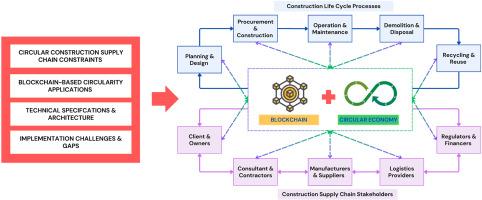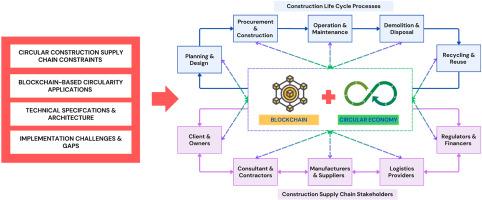基于区块链的供应链框架,推动建筑行业循环经济
IF 10
1区 环境科学与生态学
Q1 ENGINEERING, ENVIRONMENTAL
引用次数: 0
摘要
建筑行业向循环经济的转变受到多重挑战的阻碍。然而,区块链的出现显示出克服这些障碍的巨大潜力。然而,关于建筑供应链中基于区块链的循环经济应用的系统实施动态的研究有限。本文提出了一个基于区块链的建筑供应链框架,以推进建筑行业的循环经济。采用系统证据综合(SES)、原型和案例研究三角法来回顾、实验和验证研究结果。从Scopus和Web of Science数据库中为SES过程确定了相关的探索性和实验性案例。初步调查结果突出了主要的实施领域,包括材料护照、废物交易和逆向物流。Hyperledger和以太坊被进一步确定为开发原型的领先实现平台。从原型开发中确定的关键挑战包括,有限的模拟样本,有限的性能可伸缩性,以及投资回报的不确定性。为了解决所发现的挑战和差距,提出了基于区块链的循环建筑供应链(BCCSC)框架。通过概念验证原型对所提出框架中的模块进行了实验,以证明其可行性。最后,对选定的跨行业案例进行三角分析,得出概念上的相似之处和实施中的潜在缺陷。通过基于区块链的网络市场,可以深化建筑供应链中的利益相关者互动,以支持循环商业模式。此外,该框架的模块化允许容易的可伸缩性和实际实现。建议研究降低成本和加强协作策略,以及开发全尺寸模块以展示端到端功能。本文章由计算机程序翻译,如有差异,请以英文原文为准。


A blockchain-based supply chain framework for advancing circular economy in the construction industry
The construction industry's shift to a circular economy has been hindered by multiple challenges. The emergence of blockchain has however demonstrated promising potential in overcoming these barriers. Nonetheless, there is limited research regarding the system implementation dynamics of blockchain-based circular economy applications within the construction supply chain. This paper proposes a blockchain-based construction supply chain framework for advancing circular economy in the construction industry. Systematic Evidence Synthesis (SES), prototyping, and case study triangulation approaches are adopted to review, experiment, and validate the findings.
Relevant exploratory and experimental cases are identifed from Scopus and Web of Science databases for the SES process. The initial findings highlighted the main implementation domains, to include material passports, waste trading, and reverse logistics. Hyperledger and Ethereum are further identifed as the leading implementation platforms for developing prototypes. The key challenges identified from prototype development included, limited simulation samples, limited performance scalability, and uncertainty with return on investment. To address the challenges and gaps identified, a blockchain-based circular construction supply chain (BCCSC) framework is proposed. Modules from the proposed framework are experimented through a proof-of-concept prototype to demonstrate feasibility. Finally, selected cross-industry cases were triangulated to draw conceptual parallels and potential drawbacks in implementation.
Through a blockchain-based web marketplace, stakeholder interactions in the construction supply chain can be deepened to support circular business models. Furthermore, the framework's modularization allows for easy scalability and practical implementation. Recommendations are made towards research in cost reduction and enhanced collaboration strategies, as well as developing full-scale modules to demonstrate end-to-end functionality.
求助全文
通过发布文献求助,成功后即可免费获取论文全文。
去求助
来源期刊

Journal of Cleaner Production
环境科学-工程:环境
CiteScore
20.40
自引率
9.00%
发文量
4720
审稿时长
111 days
期刊介绍:
The Journal of Cleaner Production is an international, transdisciplinary journal that addresses and discusses theoretical and practical Cleaner Production, Environmental, and Sustainability issues. It aims to help societies become more sustainable by focusing on the concept of 'Cleaner Production', which aims at preventing waste production and increasing efficiencies in energy, water, resources, and human capital use. The journal serves as a platform for corporations, governments, education institutions, regions, and societies to engage in discussions and research related to Cleaner Production, environmental, and sustainability practices.
 求助内容:
求助内容: 应助结果提醒方式:
应助结果提醒方式:


